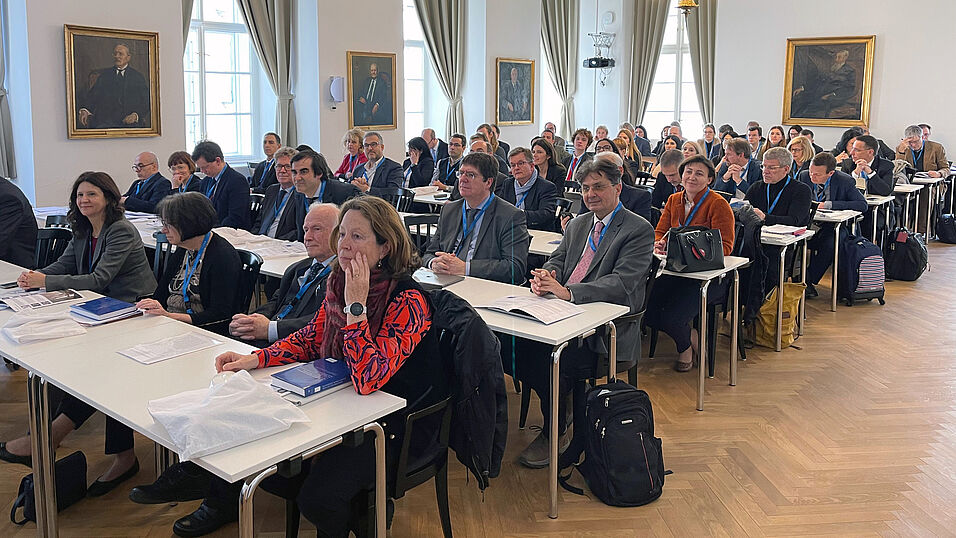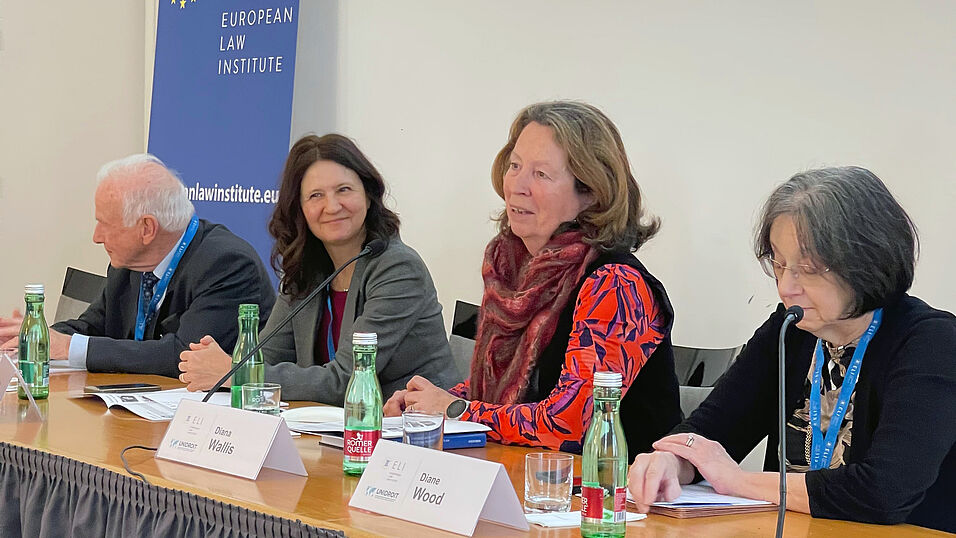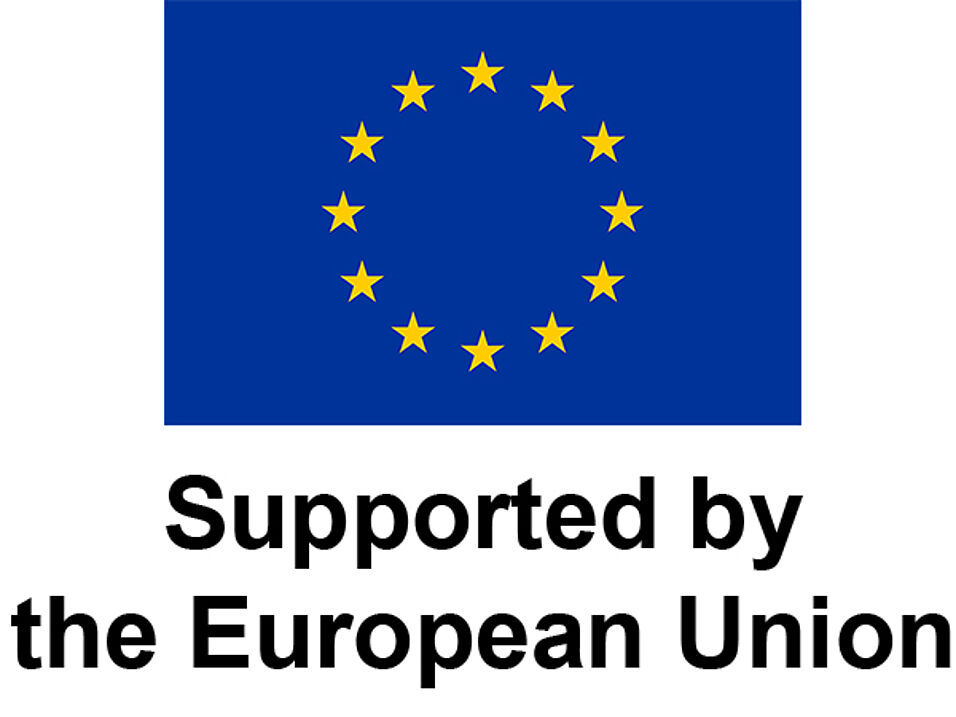The Conference, which gathered close to 80 experts from Europe and beyond, reignited discussion on the importance and impact that the Model Rules have had and continue to have since they were published in 2021. It was opened by Prof Dr Manuela Baccarini (Vice-Rector for Research and International Affairs, University of Vienna), Prof Dr Pascal Pichonnaz (ELI President, University of Fribourg) and Prof Dr Ignacio Tirado (Professor, UNIDROIT Secretary-General), who welcomed participants.
Baccarini noted that the common standards the ELI-UNIDROIT Model European Rules for Civil Procedure seek to achieve, and the common trust they seek to build, are necessary prerequisites to lowering the barriers to human mobility and to working together. She thanked ELI and UNIDROIT for building the trust and confidence that institutions like the University of Vienna need to work and thrive.
Pichonnaz said that the ELI-UNIDROIT Model Rules constitute a real achievement that deserves recognition at large. He mentioned that the Model Rules have been published by Oxford University Press and have already been translated into French and Spanish, with other translations underway. Pichonnaz concluded by congratulating all who have been active in completing the Model Rules and sent greetings on behalf of ELI’s Scientific Director, Prof Dr Christiane Wendehorst, who is also the President of the Division of Humanities and Social Sciences of the Austrian Academy of Sciences.
Tirado observed that the Model Rules are a prodigy of balance; an example of how representatives of different legal families were able to establish a dialogue and find some common ground as a starting point for legislative reform. He mentioned that interest was already expressed from other regions of the world to replicate the work and that a similar project is already ongoing in Latin America. He then thanked all the authors and experts involved in elaborating the Model Rules.
Panel I – The ELI-UNIDROIT Model Rules: An Overview
Diana Wallis (Solicitor, Mediator, MICArb, Senior Fellow; Co-Chair of the Steering Committee of the ELI-UNIDROIT project on behalf of ELI) and Prof Dr Anna Veneziano (Professor, Deputy Secretary-General of UNIDROIT; Co-Chair of the Steering Committee of the ELI-UNIDROIT project on behalf of UNIDROIT) co-chaired the panel.
Prof Dr Rolf Stürner (Professor emeritus, University of Freiburg; Member of the Steering Committee of the ELI-UNIDROIT project on behalf of UNIDROIT) provided a comprehensive introduction on the Model Rules. Among other things, he explained the process of elaborating the Model Rules and emphasised the principles that guided the drafters, such as the prioritisation of the amicable settlement of conflicts, the principle of cooperation between parties and the court, and the proportionate use of resources. He also noted some of the innovative aspects of the Model Rules, namely the inclusion of collective redress, solutions concerning the financing of the proceedings, and aspects of modern communication and Artificial Intelligence.
Diane P Wood (Senior Judge of the US Court of Appeals for the 7th Circuit; Director of the American Law Institute; Senior Law Lecturer at the University of Chicago) discussed the specificities of American civil procedure rules, noting the diversity among the States. She also listed some of the advantages of the uniformity of procedural rules, such as the avoidance of forum shopping, increased possibilities for cross-border cases and for the recognition of foreign judgements. Wood then went on to analyse some of the similarities and differences between the American system and ELI-UNIDROIT Model Rules.
Panel II – Enhancing Convergence: The Approach of the Model Rules to Case Management and Cooperation, and Access to Information and Evidence
Diana Wallis chaired the panel.
Prof Dr Cornelis Hendrik (Remco) van Rhee (Professor, Maastricht University; Co-Reporter of the ‘Obligations of the Parties and Lawyers’ Working Group of the ELI-UNIDROIT project) focused his presentation on the principle of cooperation. He discussed Rules 2 and 6 of the Model Rules, requiring different actors of the civil proceedings to cooperate, so that the resolution of the dispute is fair, efficient and speedy, as well as proportionate.
Prof Dr Alan Uzelac (Professor, Zagreb University; Co-Reporter of the ‘Procedural Obligations’ Working Group of the ELI-UNIDROIT project) spoke on the practical impact that the ELI-UNIDROIT Model Rules’ have had and provided examples from the reforms of Croatian civil procedure rules, where the ELI-UNIDROIT Rules were influential, in particular with regard to illegally obtained evidence and the principle of cooperation.
Prof Dr Fernando Gascón Inchausti (Professor, Complutense University of Madrid; Co-Reporter of the ‘Access to Information and Evidence’ Working Group and a member of the ‘Res Iudicata and Lis Pendens’ and ‘Appeals’ Working Groups) talked about the approach of the Model Rules to access to information and evidence.
Prof Dr Anna Nylund (Professor, University of Bergen) followed as an external discussant and spoke about case management and cooperation as well as about access to evidence. In her presentation she discussed the potential for the reception of the Rules and challenges with respect to their dissemination.
Panel III – Treading New Ground: The Approach of the Model Rules to Collective Redress, Costs, Res Iudicata
Prof Dr Ignacio Tirado chaired the panel.
Prof Dr Stefaan Voet (Professor, University of Leuven; Member of the ‘Parties and Collective Redress’ Working Group) focused his presentation on collective redress. He also touched upon Third Party Funding of Litigation and cross-border issues.
Prof Dr Eva Storskrubb (Professor, Uppsala University; Co-Reporter of the ‘Service of Documents and Due Notice of Proceedings’ Working Group), spoke about costs, including aspects of Third Party Funding of Litigation while Prof Dr Burkhard Hess (Professor, University of Vienna; Co-Reporter of the ‘Lis Pendens and Res Iudicata’ Working Group) touched on the issue of pendency and res iudicata.
Prof Dr Georg Kodek (President of the Austrian Supreme Court) provided his perspective on all three topics as an external discussant. He also spoke about the practical effects the Model Rules have on the current debate in the field of civil procedure.
Panel IV – New Technologies in Civil Procedure and Enforcement
Prof Dr Xandra Kramer (Professor, Erasmus University Rotterdam, Utrecht University; Deputy Judge in the District Court of Rotterdam; Co-Reporter of the ‘Structure Group’) chaired the panel.
Dr John Sorabji (Associate Professor, University College London); Member of the ‘Structure Group’) talked about how the ELI-UNIDROIT Model Rules deal with new technologies. He explained that the Model Rules are intended to be ‘tech neutral’ so that they fit any digitisation programme. They provide the basis for the use of technology (eg Rule 18(4)) which must, however, be developed and used consistently with fundamental principles.
Prof Dr Teresa Rodríguez de las Heras Ballell (Professor, University Carlos III of Madrid) reflected on how the technology context has changed over the years and how many already developed instruments can facilitate shaping the rules in the civil procedure field. She also referred to ELI’s Guiding Principles on Automated Decision Making, of which she authored.
Anna Skrjabina (Consultant and Researcher, University of Latvia) spoke about new technologies in civil procedure and enforcement. Among others, she discussed case management in the digital environment and online dispute resolution (ODR). She also reflected on the ELI Project on Digitalisation of Civil Justice Systems in Europe, of which she is a Co-Reporter.
Panel V – The ELI-UNIDROIT Model Rules and Current or Prospective Reforms of Civil Procedure
Prof Dr Remo Caponi (Judge, Italian Supreme Court; member of the Steering Committee of the ELI-UNIDROIT project on behalf of ELI) chaired the panel.
Prof Dr Masood Ahmed (Associate Professor, University of Leicester) informed participants about recent English civil justice reforms and how the Model Rules are influencing them. Among others, he focused on the rules on cooperation and settlement, ie Rule 9 and 10 of the Model Rules, respectively.
Dr Norel Rosner (Legal and Policy Officer, Directorate-General for Justice and Consumers, European Commission) focused on how the work of the European Commission and the ELI-UNIDROIT team mutually influenced each other. He provided specific examples of where the Model Rules influenced the EU acquis, eg with respect to the recast of the service of documents regulation, and with respect to access to evidence – introduction of taking of evidence with videoconference, which was a result of different sources of inspiration, one of them being the Model Rules.
Panel VI – The Relevance of the Translations of the Model Rules
Prof Dr Anna Veneziano chaired the panel.
Prof Dr Emmanuel Jeuland (Professor, Paris 1 Panthéon-Sorbonne University; Member of the group translating the Model Rules into French) spoke about challenges encountered during the translation of the Rules and the choices made. Among others, he discussed the issue of untranslatable words and situations when one word in one language needs to be replaced with several words in another language, providing several illustrations and examples.
Prof Dr Marco de Benito (Professor, IE University; Member of the group translating the Model Rules into Spanish) explained the process of translating the Model Rules into Spanish and raised the difficulties the Team encountered. He provided several examples to illustrate the choices made to ensure fluency and concordance with national law. He also noted the advantages of having recourse to both the English and French versions when translating into Spanish and challenges with Latin terminology, which is not used in Spanish legal language.
Prof Dr Elisabetta Silvestri (Professor, University of Pavia; Member of the group translating the Model Rules into Italian) provided an update on the ongoing Italian civil procedure law reforms and the importance of the availability of the forthcoming Italian translation of the Model Rules in that respect. She also provided examples of challenges encountered when translating the Model Rules into Italian.
All panels were followed by lively discussions with participants.
ELI is very grateful for all the contributions by speakers and other participants of the Conference and wishes to thank UNIDROIT for the excellent cooperation in organising the Conference as well as the Austrian Academy of Sciences for hosting the event.
The Conference Brochure is available here.



